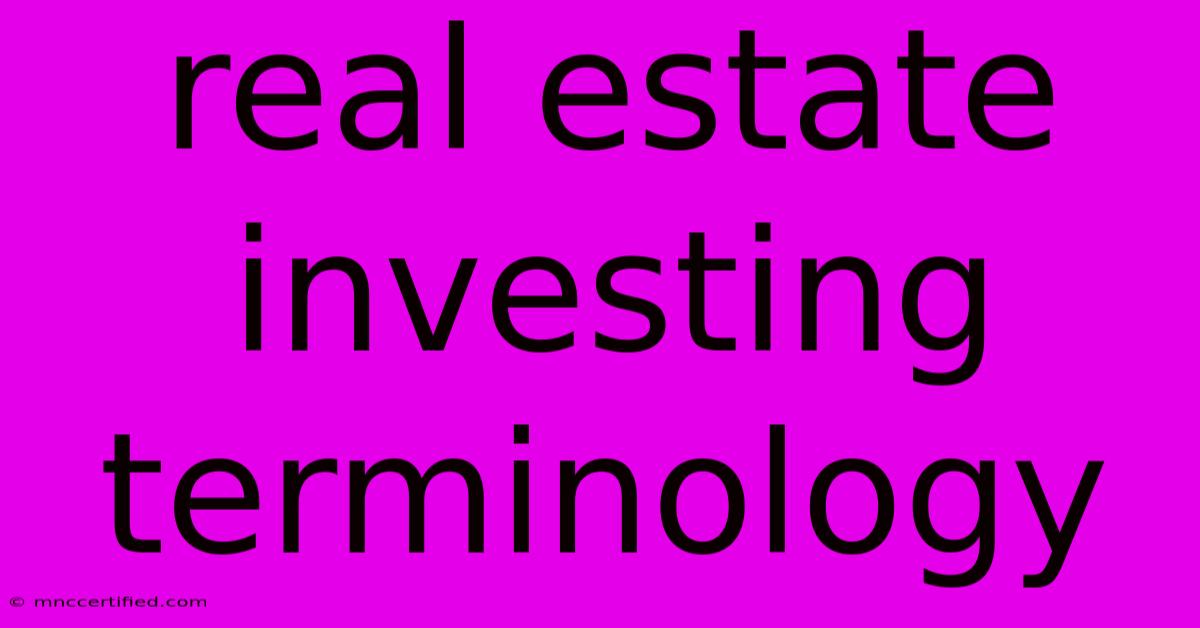Real Estate Investing Terminology

Table of Contents
Decoding the Language of Real Estate Investing: A Comprehensive Terminology Guide
Real estate investing can seem like a world of its own, filled with jargon that can be confusing for newcomers. Understanding the terminology is crucial for navigating the market successfully and making informed decisions. This comprehensive guide breaks down essential real estate investing terms, empowering you to confidently participate in this potentially lucrative field.
Fundamental Terms Every Investor Should Know
Let's start with the building blocks – the terms you'll encounter most frequently in your real estate journey:
1. Appreciation:
This refers to the increase in the value of a property over time. Appreciation is a key driver of real estate investment returns, although it's not guaranteed and can be influenced by market conditions.
2. Depreciation:
The opposite of appreciation, depreciation is the decrease in the value of a property. This can be due to various factors, including age, wear and tear, or market downturns. For tax purposes, investors can depreciate certain aspects of investment properties.
3. Equity:
Equity represents the portion of a property you own outright. It's the difference between the property's current market value and the amount you still owe on your mortgage (if any). Building equity is a major goal for many real estate investors.
4. Leverage:
Leverage is using borrowed money (like a mortgage) to finance an investment. It magnifies both profits and losses. Understanding leverage is vital for managing risk effectively.
5. Cash Flow:
Cash flow is the difference between the income generated by a rental property and the expenses associated with it. Positive cash flow means the property generates more income than expenses, while negative cash flow signifies the opposite.
Delving Deeper: More Advanced Terminology
As you gain experience, you'll encounter more specialized terms. Here are some key examples:
1. Cap Rate (Capitalization Rate):
The cap rate is a measure of a property's potential return on investment. It's calculated by dividing the net operating income (NOI) by the property's purchase price. A higher cap rate generally indicates a better investment opportunity, all else being equal.
2. Net Operating Income (NOI):
NOI represents the property's income after deducting operating expenses (e.g., property taxes, insurance, maintenance) but before accounting for debt service (mortgage payments). It's a crucial metric for evaluating a property's profitability.
3. Return on Investment (ROI):
ROI measures the profitability of an investment relative to its cost. It's calculated by dividing the net profit by the total investment cost. A higher ROI is generally preferred.
4. Fixer-Upper:
A fixer-upper is a property requiring significant repairs or renovations. These properties can offer potential for high returns but also come with considerable risk and upfront costs.
5. Wholesaling:
Wholesaling involves finding undervalued properties, securing a contract to purchase them, and then assigning (selling) the contract to another investor. Wholesalers profit from the difference between the assignment fee and their acquisition costs.
6. Flipping:
Flipping involves purchasing a property, renovating it, and quickly reselling it for a profit. It requires expertise in renovation and a good understanding of market trends.
Protecting Your Investment: Legal and Financial Terms
Understanding the legal and financial aspects is just as crucial:
1. Due Diligence:
Due diligence is the process of thoroughly investigating a property before purchasing it. This involves inspections, title searches, and reviewing financial records to uncover any potential problems.
2. Title Insurance:
Title insurance protects the buyer from financial losses due to title defects, such as undisclosed liens or ownership disputes.
3. Escrow:
Escrow is a neutral third-party account that holds funds during a real estate transaction, ensuring funds are released only after specific conditions are met.
4. Mortgage:
A mortgage is a loan used to finance the purchase of real estate. Understanding different mortgage types (e.g., fixed-rate, adjustable-rate) is crucial.
Conclusion: Mastering Real Estate Terminology for Success
This guide provides a foundation for navigating the world of real estate investing. Continuously expanding your knowledge of these terms and staying updated on market trends will significantly increase your chances of success in this dynamic field. Remember, consulting with experienced professionals, such as real estate agents and financial advisors, is highly recommended. By understanding this terminology and proactively engaging in learning, you'll be well-equipped to make informed decisions and build a robust real estate investment portfolio.

Thank you for visiting our website wich cover about Real Estate Investing Terminology. We hope the information provided has been useful to you. Feel free to contact us if you have any questions or need further assistance. See you next time and dont miss to bookmark.
Featured Posts
-
White Light Investment Management
Nov 20, 2024
-
Big 4 Audit To Investment Banking
Nov 20, 2024
-
August Giducos Plan D Investments
Nov 20, 2024
-
Title Insurance Business For Sale
Nov 20, 2024
-
Are Mobile Home A Good Investment
Nov 20, 2024